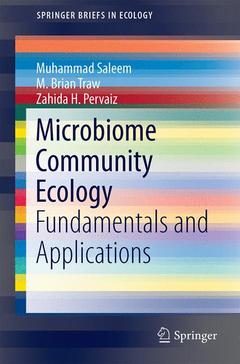Microbiome Community Ecology, 2015 Fundamentals and Applications SpringerBriefs in Ecology Series
Auteur : Saleem Muhammad

Microbiome ecosystem ecology: unseen majority in an anthropogenic ecosystem
Authors: M. Saleem
Abstract
1. Microbiome ecosystem ecology
References
Chapter 2.
Theories, mechanisms and patterns of microbiome species coexistence in an era of climate change
Authors: M. Saleem, ZH Pervaiz, MB Traw
Abstract
2.1. Niche theory and microbial diversity
2.1.1. Temperature-metabolic theory of ecology
(i). Thermal niche specialization
(ii). Temperature as a driver of ecological divergence, evolution, speciation and thermal niche evolution trade-offs
2.1.2. Implication of habitat heterogeneity in determining ecological niche
(i). Resource heterogeneity
Factors determining resource heterogeneity
Optimal foraging theory of ecology
r/K selection theory of ecology
(ii). Role of habitat physical structure and variations in determining ecological niche
(iii). Role of habitat pH in determining ecological niche
(iv). Role of biotic factors in determining ecological niche
2.2. Island biogeography theory and microbial diversity
2.2.1. Ecology theory of species area relationship
2.2.2 Ecological theory of distance decay relationships (DDR)
(i). Elevational patterns of microbial diversity
(ii). Latitudinal pattern of microbial diversity
2.3. Species–time relationships (STRs)
2.4. Neutral theory and microbial diversity
References
Chapter 3.
Eco-evolutionary processes regulating microbiome community assembly in a changing global ecosystem
Authors: M. Saleem
Abstract
3. Processes underlying microbiome community assembly
3.1. Selection
3.1.1. Constant selection pressure
3.1.2. Frequency- or density-dependent selection
(i). Negative frequency- or density-dependent selection
(ii). Positive frequency- or density-dependent selection
(iii). Spatially- or temporally-variable selection
3.2. Drift
3.2.1. Ecological drift
3.2.2. Evolutionary or genetic drift
3.2.3. Neutral drift
3.3. Dispersal
3.3.1. Environmental factors determining dispersal
(i). Dispersal in air/atmospheric ecosystem and air mediated microbial dispersal
(ii). Water currents and movement
(iii). Nutrients-mediated microbial dispersal
(iv). Miscellaneous factors determining microbial dispersal
3.3.2. Factors liming the dispersal of microbes
3.4. Diversification, speciation and mutation
5. Dormancy
References
Chapter 4.
Loss of microbiome ecological niches and diversity by global change and trophic downgrading
Authors: M. Saleem
Abstract
4. Habitat alteration, trophic downgrading and microbiome biodiversity loss
4.1. Atmosphere ecosystem
4.2. Phyllosphere ecosystem
4.3 Rhizosphere ecosystem
4.4. Human and animal ecosystem
4.5 Aquatic ecosystems
4.6 Extreme ecosystems
4.6. Miscellaneous
References
Chapter 5.
Microbiome mediated multitrophic interactions in an age of microbial extinction
Authors: M. Saleem
Abstract
5.1. Trophic interactions
5.1.1 Trophic interactions with protists predators
5.1.2. Trophic interactions with predatory bacteria
5.1.3. Trophic interactions with viruses
5.1.4. Multi-trophic interactions
5.2 Non-trophic interactions
References
Chapter 6.
Global microbiome for agroecology, industry and human well-being: opportunities and challenges in climate change
Authors: M. Saleem
Abstract
6. Microbiome diversity-functioning research in the context of biodiversity and ecosystem functioning research
6.1 Major applications of microbiome diversity-functioning research
6.1.1. Nutrient management
6.1.2. Plant growth promotion
(i) Phyllosphere associated microbiome and plant fitness
(ii) Rhizosphere associated microbiome and plant fitness
6.1.3 Bioremediation and phytoremediation
6.1.4 Human and animal host fitness
6.1.5 Eco-biotechnology/microbiome industrial processes
6.2 Emerging issues in microbiome diversity-functioning research
6.2.1 Mechanisms of microbiome species coexistence
6.2.2 Linking microbiome diversity to multi-trophic interactions
6.2.3 Habitat alterations, greenhouse gas emissions and microbiome diversity loss
6.2.4 Methodological, experimental and theoretical limitations
References
Describes the mechanisms and patterns of prokaryotic diversity
Addresses how climate change will impact prokaryotes, their habitats, and their diversity
Takes a unique ecological and evolutionary perspective
Includes supplementary material: sn.pub/extras
Date de parution : 01-2015
Ouvrage de 152 p.
15.5x23.5 cm
Disponible chez l'éditeur (délai d'approvisionnement : 15 jours).
Prix indicatif 58,01 €
Ajouter au panier


